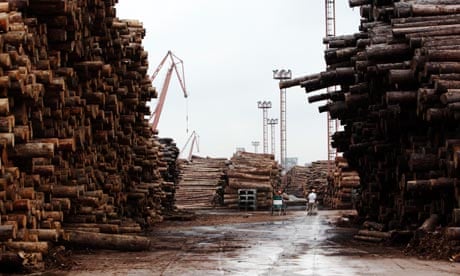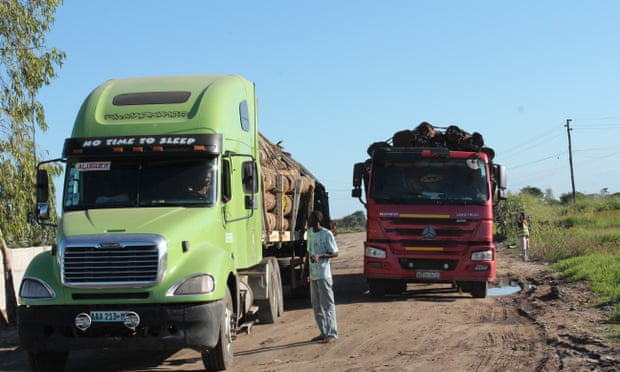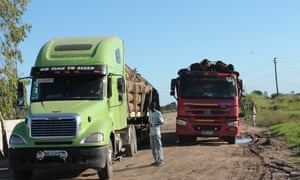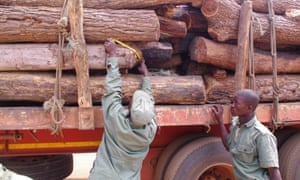Mozambique faces race against time to end illegal logging
The southern African country is losing millions in lost taxes from illegal logging, much of it destined for China
Wednesday 31 August 2016


“We are cleaning the house now”, says Celso Correia. The young, smartly-dressed, minister for land, environment and rural development in Mozambique is talking about the corruption and illegal logging that has dogged the southern African country’s timber sector for more than a decade.
As recently as 2013, a remarkable 93% of all the logging taking place in the country was happening illegally, according to a report from the nonprofit Environmental Investigation Agency (EIA).
As well as leading to unsustainable levels of deforestation, the export of illegally logged timber was also depriving the country of tens of millions of dollars a year in lost tax revenue.
The driving force behind this boom in illegal logging was China, the biggest importer of logs in the world. Chinese traders accounted for more than 90% of Mozambique’s timber exports in 2013, according to the environmental research organisation IIED. In 2014 Mozambican wood entering China surpassed $400m, up from $90m in 2009, according to the Africa Monitor (paywall).
Correia, who started in his job in the newly created environment department last year, acknowledges his country is a stark example of what happens when insatiable demand for logs, in this case from China, converges with weak law enforcement and corruption. His ambition is to change that.
“We have seized more illegal wood in one year than Mozambique has since independence,” he says. “We are passing a new forestry law and a new conservation law.”
Correia and Mozambique’s long-term ambition is to develop a more sustainable timber market in the country, including developing a larger processing industry in the country rather than just exporting the logs. “We don’t mind people cutting trees. We need to have a sustainable forest and we need to have a market,” he says.
In Gile National Reserve, situated in Zambezia Province, such measures are desperately needed. A total of 35 logging licences created a huge circle of harvested land around the reserve boundary for the 2,980km squared of protected area. After years of logging in the country, the reserve is the last area where Pau Ferro, a highly sought-after wood, still exists in Mozambique.
Gile National Reserve attracts few tourists but an alarming number of illegal loggers, according to the warden Jose Dias. Since 2012, his team has captured a total of 58 trucks and 10 tractors packed with Pau Ferro from the reserve. He told me, “the majority of illegal acts are not detected”.
Dias said the looting amounted to organised crime and involved a network of government officials, Chinese buyers, communities and even staff from inside the reserve.
The government has responded to the issue by banning the cutting of Pau Ferro for five years. But the ban means little to Jorge Bing, a major timber dealer in Zambezia province. “When villagers bring you the best wood on the market, ” he told me, “why would you say no to it?”
The other ambition: to create a domestic processing market for timber in Mozambique, is not new. The government issued a partial export ban of so-called first class wood species in high demand from China, including Pau Ferro, in 2002 [pdf]. In late 2015, the Mozambique government then decided to expand the ban to all raw timber logs for two years.
The ban was meant to create added value in Mozambique, by encouraging the processing of wood into planks before they are exported to China, but it does not appear to be working. “The domestic processing sector does not have the capacity to absorb the logs,” says Anne Terheggen, a sustainable trade specialist from Centre for International Forestry Research.
Correia says he hopes to entice more responsible Chinese companies to Mozambique. “When they decide to come, they will be the ones who solve our problems.”
One of these new, potentially more responsible approaches is being proposed by Zheng Fei, a 50-year-old Chinese timber businessman who’s been in Mozambique since 1998, and who has declared his intention to build a “Sino-Mozambique forest resource ecological zone”. He’s already received technical advice from WWF on the project.
In a 3km square piece of land located in Mocimboa da Praia, a port city in northern Mozambique, the ecological zone for now only has a sawmill and a wood-drying plant. According to Zheng’s plan, within five years, as well as ensuring a responsible attitude to timber resources, the site would host a complete production line for furniture and other wood products as he hopes to encourage other Chinese companies to set up in the zone. This may be optimistic with China under pressure to source raw wood materials for its own manufacturing sector due to a lack of domestic supply, according to consulting firm International Wood Market Group. As a result, the demand for processing facilities in Mozambique is limited, which is part of the reason they are not being built. “China wants the timber as raw in form as possible. They don’t want to invest in manufacturing or invest in the country they’re operating in,” Jago Wadley, senior forest campaigner at the EIA, has said.
Zheng and Correia both say that the drop in demand from China for timber exports since 2014 has provided an opportunity for reform in Mozambique, but Correia estimates that it will take at least a decade to build a more sustainable logging industry in Mozambique.
“The Mozambique case is very complicated,” said WWF China forest campaigner Wang Lei. “Perhaps the current market will eliminate some poorly performing Chinese companies and hopefully bigger companies could behave better. But it’s unpredictable.”With China’s timber and forest products imports expected to increaseby 60m cubic meters by 2025, that may not be enough time to prevent a repeat of illegal and unsustainable logging. The EIA has warned that commercial timber stocks in the country will be largely depleted within the next 15 years.
Ning Hui received funding for this investigation from the Global Environment Institute
• This article was amended on 31 August 2016. An earlier version gave the year of Mozambique’s independence as 1992. The country gained independence in 1975.


No comments:
Post a Comment
Comments always welcome!